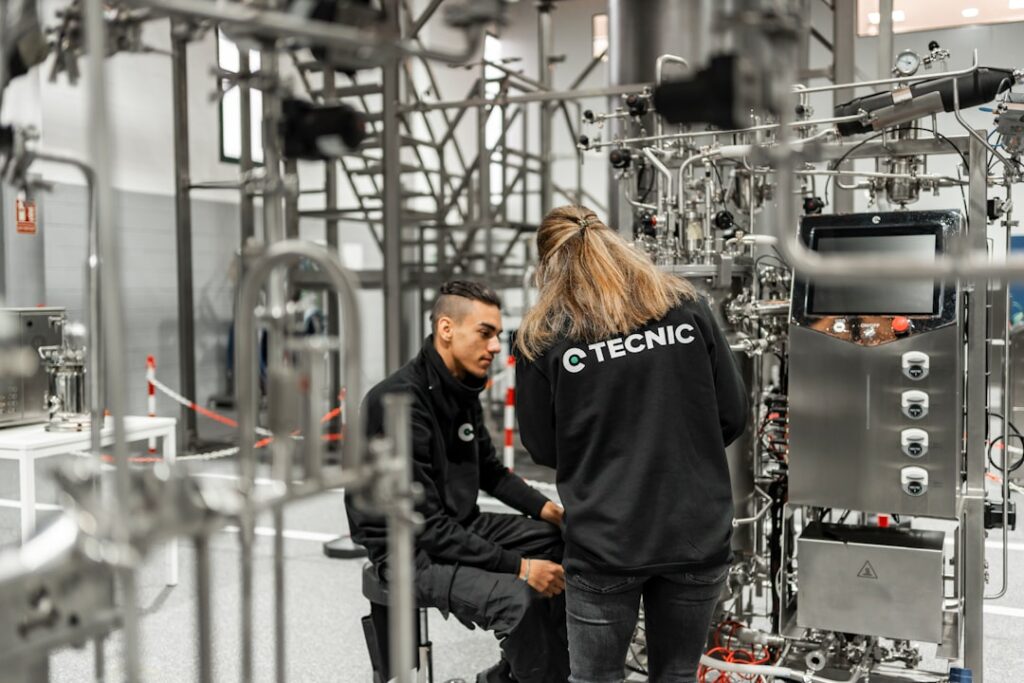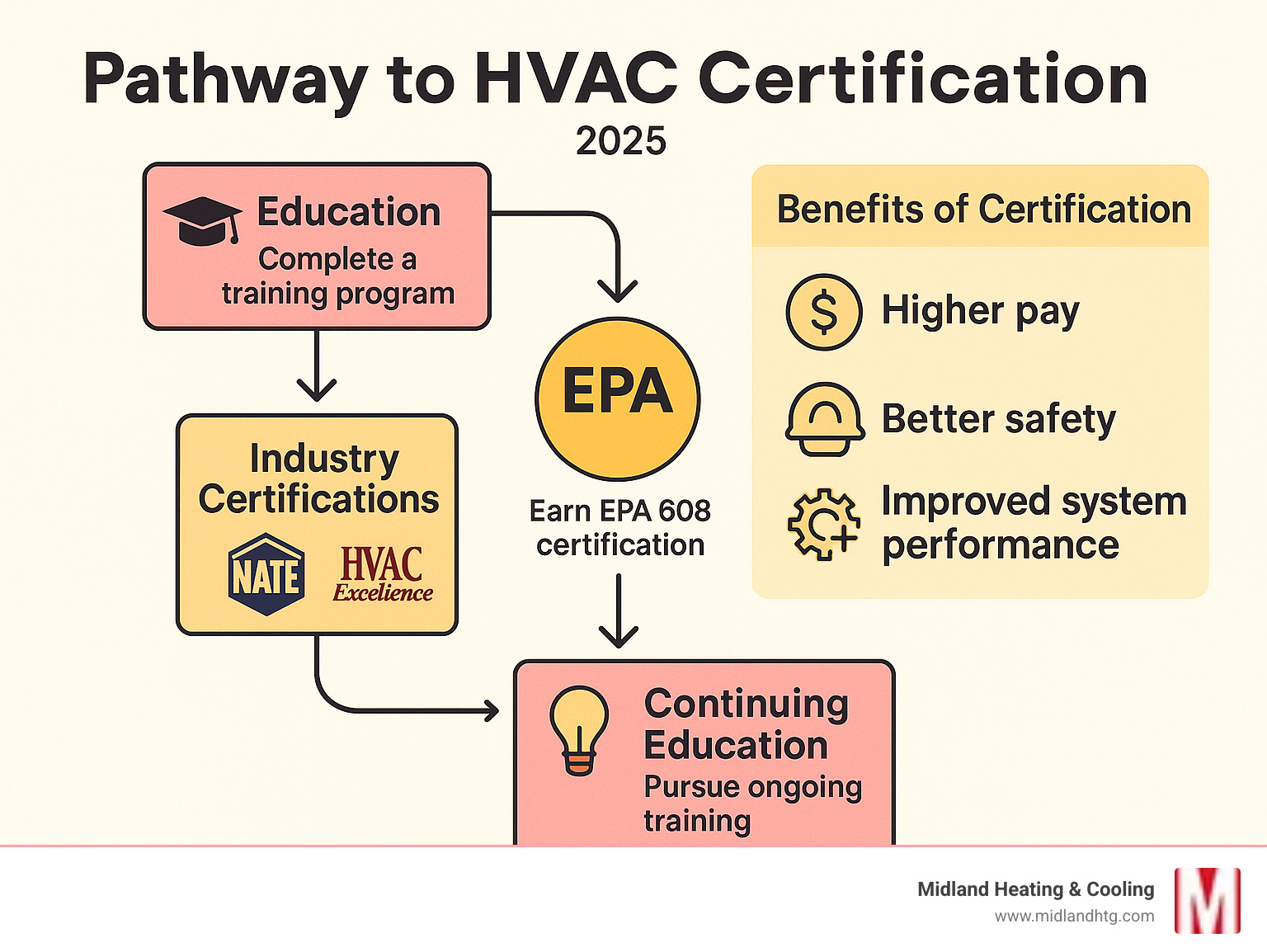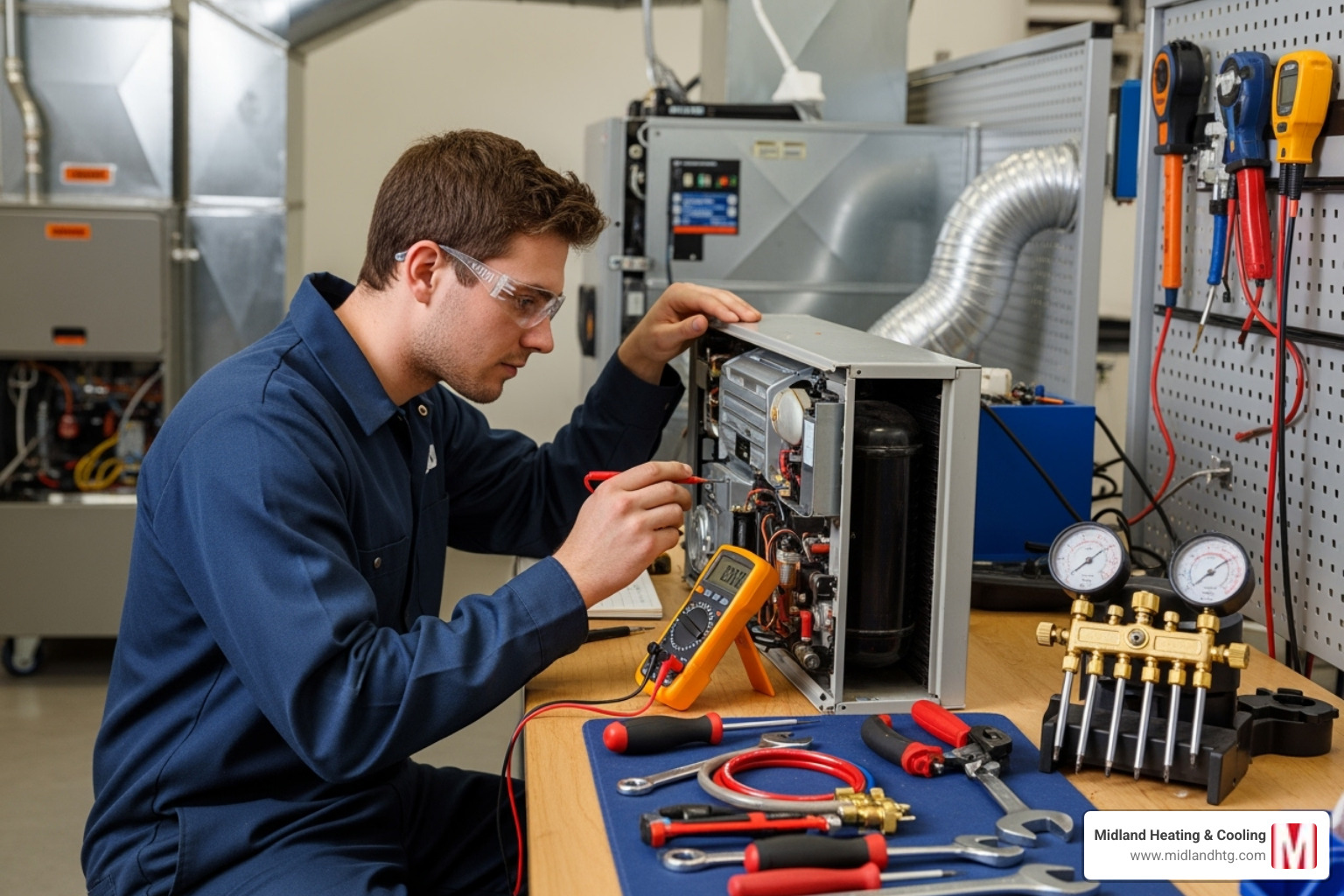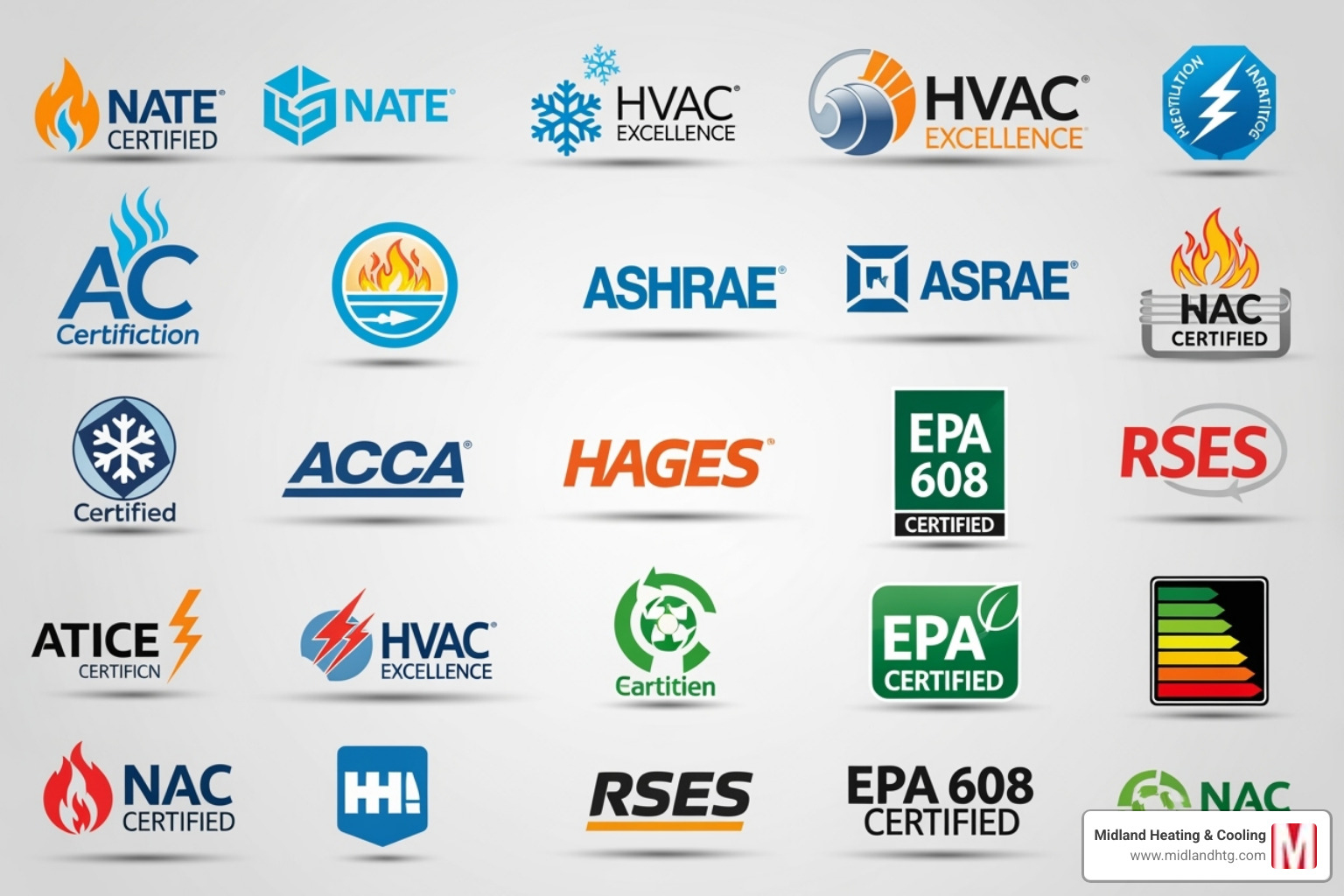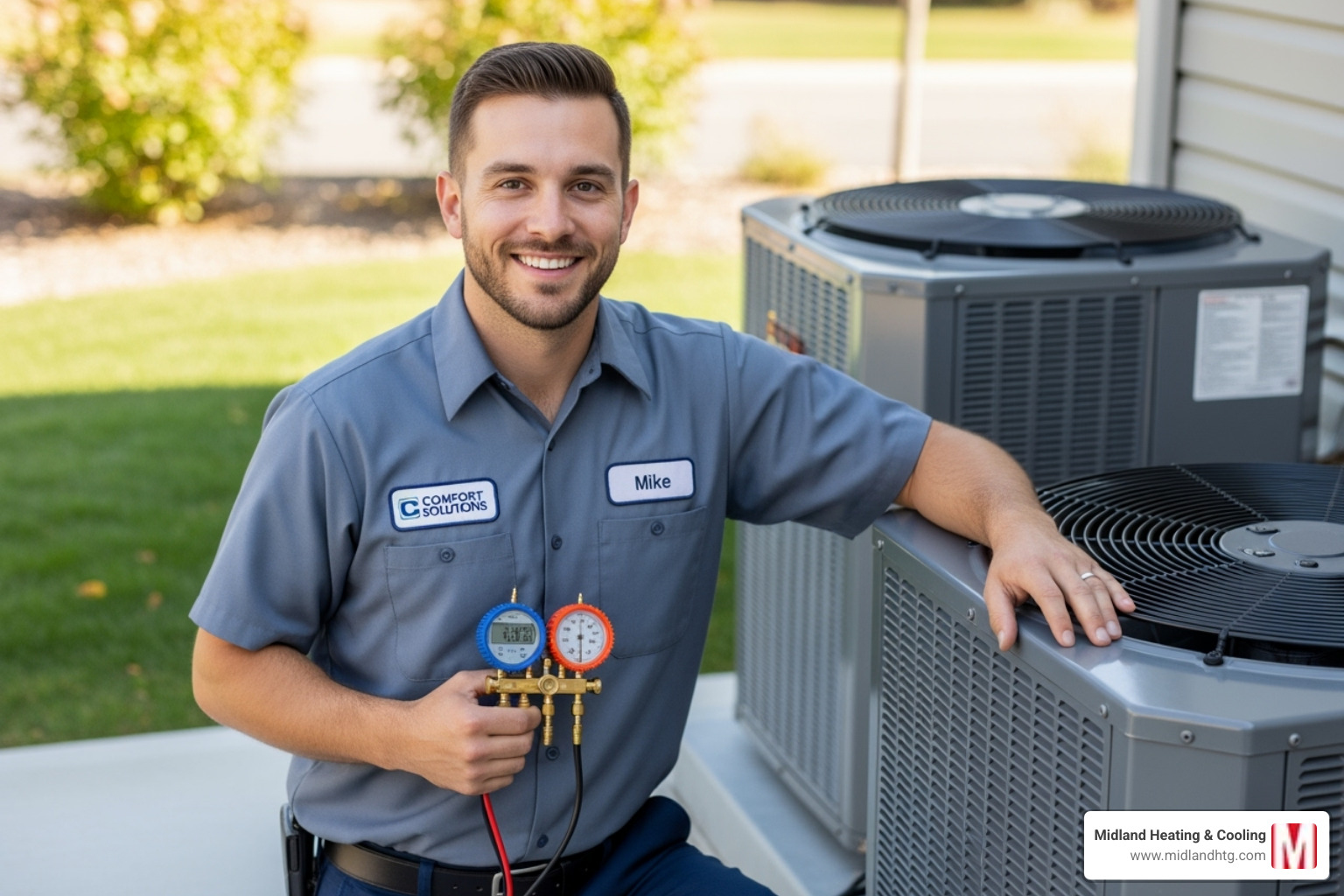Why HVAC Certification Matters for Your Home’s Comfort and Safety
Certified HVAC technicians are skilled professionals who have completed specialized training and passed rigorous exams to prove their expertise in heating, ventilation, and air conditioning (HVAC) systems. Holding credentials from organizations like EPA, NATE, or HVAC Excellence, they can safely and effectively install, maintain, and repair your home’s comfort systems.
Quick Answer: What Makes an HVAC Technician “Certified”?
- EPA 608 Certification – Required by federal law to handle refrigerants safely
- Industry Certifications – NATE, HVAC Excellence, or RSES credentials proving technical expertise
- Ongoing Training – Continuous education to stay current with new technologies and safety standards
- Proven Skills – Passed written and practical exams demonstrating competency
The HVAC industry is growing rapidly. The U.S. Bureau of Labor Statistics reports that most employers require HVAC technicians to obtain certification or a license before practicing. This isn’t just bureaucracy; it’s about protecting your home, family, and investment.
For homeowners in the Twin Cities, where harsh weather strains HVAC systems, working with certified technicians is essential. A certified technician is always paid more than an uncertified one because they bring proven expertise, safety knowledge, and the ability to handle complex, potentially dangerous refrigerants.
Whether you’re facing an emergency repair during a Minnesota blizzard or planning preventative maintenance, understanding HVAC certification helps you make informed decisions about who touches your home’s comfort systems.
What an HVAC Technician Does and Why Certification Matters
An HVAC technician is your home’s comfort guardian, ensuring your family stays cozy in winter, cool in summer, and breathes clean air year-round. The job combines technical expertise with care for people’s well-being.
An HVAC technician’s day is varied. They might install a new system in a Twin Cities home, ensuring peak performance. Later, they could perform Preventive Maintenance on a furnace to prevent costly issues. During emergencies, their diagnostic skills are crucial for Expert Heater Repair Services that quickly restore comfort.
The job is challenging because HVAC systems are increasingly sophisticated. Technicians now work with smart thermostats, variable-speed motors, and advanced refrigeration systems requiring deep technical knowledge. They are part electrician, plumber, and computer technician. Learn more in our guide on What an HVAC Technician Does.
Why does certification matter so much? Simply put, it’s the difference between someone who says they know HVAC work and someone who can prove it. When you’re dealing with gas lines, electrical systems, and chemical refrigerants, “close enough” isn’t good enough. Certification ensures that the person working on your system has passed rigorous tests and meets strict safety standards.
The Importance of Certification for Technicians
For HVAC professionals, getting certified isn’t just about following rules – it’s about building a career that actually pays the bills and provides long-term security. Certified HVAC technicians consistently earn more money than their uncertified counterparts, sometimes significantly more. We’re talking about the difference between scraping by and building a comfortable middle-class lifestyle.
The numbers don’t lie. Experienced certified technicians can earn $90,000 or more annually, especially in demanding markets like Minnesota where extreme weather puts HVAC systems to the test. But beyond the paycheck, certification opens doors that would otherwise stay locked. Employers prefer certified technicians because they know these professionals can handle complex jobs safely and correctly.
Career advancement becomes much easier with proper credentials. Want to become a lead technician? Start your own business? Move to a different state? Certification makes all of these goals more achievable. It’s like having a professional passport that’s recognized throughout the industry.
There’s also something to be said for the confidence that comes with certification. When you’ve studied hard, passed demanding exams, and earned your credentials, you approach each job knowing you have the skills to handle whatever comes up. That confidence shows, and customers notice. For detailed career information, the U.S. Bureau of Labor Statistics on HVAC careers provides excellent insights into this growing field.
Why Homeowners Should Hire Certified HVAC Technicians
As a homeowner, you might wonder if certification really matters when you’re facing a broken furnace in January. The short answer? Absolutely. Here’s why smart homeowners always choose Certified HVAC technicians.
Your system will actually work properly. Certified technicians understand proper sizing, installation techniques, and efficiency optimization. They know that an oversized system will cycle on and off constantly, driving up your energy bills and wearing out faster. They understand airflow, ductwork design, and how all the pieces work together.
Safety isn’t negotiable. HVAC work involves natural gas, high-voltage electricity, and chemical refrigerants. One mistake can lead to gas leaks, electrical fires, or dangerous chemical exposure. Certified HVAC technicians have extensive safety training and know how to work with these potentially dangerous systems without putting your family at risk.
Code compliance protects your investment. Local building codes exist for good reasons, and certified technicians stay current on these requirements. Proper permits and inspections might seem like paperwork hassles, but they protect your home’s value and ensure your insurance coverage remains valid.
Your warranty stays intact. Many HVAC manufacturers require installation and service by certified professionals to maintain warranty coverage. Skip this requirement, and you could be stuck paying for expensive repairs that should have been covered.
Peace of mind has real value. When you hire certified professionals, you can sleep well knowing the job was done right. You’re not lying awake wondering if that repair will hold or if that new installation will cause problems down the road.
If you’re noticing unusual noises, inconsistent temperatures, or other warning signs, understanding the Signs Your HVAC System Needs Professional Repair can help you get help before small problems become big headaches.
The Pathway to Becoming a Certified HVAC Technician
Becoming one of those highly sought-after Certified HVAC technicians is like building a house – you need a solid foundation before you can add the fancy features. The journey starts with the basics and builds up to specialized expertise that homeowners can trust.
Most people begin with a high school diploma or GED. This isn’t just a checkbox to tick off – those math, science, and reading skills you learned actually matter when you’re calculating load requirements or reading technical manuals. From there, aspiring technicians have several paths to choose from.
Vocational schools and community colleges offer focused HVAC programs that typically take six months to two years. These programs are great because they’re designed specifically for the trade – no wasted time on subjects you won’t use. Apprenticeships are another popular route, combining classroom learning with real-world experience under the guidance of seasoned professionals. Think of it as getting paid to learn from the best.
Some people jump straight into on-the-job training after completing basic education. While this gets you working sooner, it usually takes longer to build the comprehensive knowledge base that formal programs provide.
Educational and Experience Requirements
Here’s where things get interesting. HVAC work isn’t just about knowing which wrench to use – it requires a solid understanding of math and physics principles. You’ll need to grasp how heat transfers, how electrical circuits work, and why air moves the way it does.
HVAC training programs dive deep into the technical side of things. Students learn about electrical fundamentals – understanding circuits, controls, and how to troubleshoot electrical problems safely. Refrigeration principles cover the refrigeration cycle, compressors, and the proper handling of refrigerants (which is crucial for EPA certification later).
The curriculum also includes system design principles, teaching students how different components work together to create comfortable indoor environments. Safety protocols are woven throughout every course because working with electrical systems, gas lines, and refrigerants requires serious attention to safety.
Hands-on experience is where classroom theory meets reality. Whether through a structured apprenticeship or supervised work experience, this practical training teaches you how to handle unexpected situations and develop the problem-solving skills that separate good technicians from great ones.
Most apprenticeships last three to five years, giving you time to work alongside experienced Certified HVAC technicians who can share the tricks of the trade that you won’t find in any textbook.
Preparing for Certification Exams
Once you’ve got the education and experience under your belt, it’s time to prove what you know. Preparing for certification exams requires dedication, but it’s totally doable with the right approach.
Study guides and practice tests are your best friends during this phase. Many certification organizations provide official study materials that mirror the actual exam format. Online courses offer flexibility for people who are already working in the field and need to study around their schedules.
Finding a mentor or joining a study group can make a huge difference. Learning from someone who’s already passed the exams gives you insider knowledge about what to expect and how to approach tricky questions.
Understanding exam formats helps reduce test anxiety. Some exams are multiple choice, others include practical demonstrations. Knowing what’s coming helps you prepare more effectively.
Time management is crucial – both for studying and for taking the actual exams. Most experts recommend allowing at least three months to prepare thoroughly, especially for comprehensive certifications.
The certification process might seem daunting at first, but remember – thousands of technicians pass these exams every year. With proper preparation and dedication, you’ll join the ranks of Certified HVAC technicians who provide reliable, professional service to homeowners throughout the Twin Cities and beyond.
An Overview of Essential HVAC Certifications
Walking into HVAC certifications for the first time can feel like trying to decode a bowl of alphabet soup. You’ll see acronyms like EPA, NATE, RSES, and HVAC Excellence everywhere. But here’s the thing – each of these certifications tells a story about what a technician knows and can do safely in your home.
Think of certifications as falling into three main buckets: federal requirements that every technician must have by law, industry standards that show a technician goes above and beyond, and specializations that prove expertise in specific areas like heat pumps or commercial systems.
The beauty of working with Certified HVAC technicians is that you’re not just getting someone who can fix your furnace – you’re getting a professional who has invested time and effort into proving their skills through rigorous testing and ongoing education.
The Role of EPA Certification in the HVAC Field
Let’s start with the big one – the certification that’s absolutely mandatory for any HVAC professional who touches refrigerants in your system. The EPA Section 608 Technician Certification isn’t optional; it’s required by federal law under the Clean Air Act.
Why does the government care so much about this? Because refrigerants can seriously damage our environment if they’re not handled properly. Think of it as a driver’s license for working with these substances – you wouldn’t want someone without a license driving your car, and you definitely don’t want someone without EPA certification handling the refrigerants in your air conditioner.
This certification proves that a technician knows how to safely handle refrigerants while protecting both your family and the environment. They understand proper recovery techniques, safe disposal methods, and how to prevent harmful leaks. For detailed information about this crucial requirement, check out the Section 608 Technician Certification information on the EPA’s official website.
The EPA 608 certification comes in four different types, and understanding them helps you know what your technician is qualified to work on:
| Certification Type | What They Can Service |
|---|---|
| Type I | Small appliances like refrigerators and window AC units (5 pounds of refrigerant or less) |
| Type II | High-pressure systems including residential and commercial air conditioners and heat pumps |
| Type III | Low-pressure appliances like large commercial chillers |
| Universal | All equipment types – the most comprehensive certification covering everything above |
Most residential HVAC technicians will have either Type II or Universal certification, since these cover the systems in your home.
Understanding NATE, HVAC Excellence, and RSES Certifications
While EPA certification is your baseline requirement, the certifications that really separate good technicians from great ones are the voluntary industry credentials. These aren’t required by law, but they show that Certified HVAC technicians are serious about their craft and committed to excellence.
NATE (North American Technician Excellence) is probably the most recognized name in HVAC certification. Think of NATE as the gold standard – it’s the nation’s largest nonprofit organization dedicated to testing HVAC technicians. What makes NATE special is its focus on real-world skills and practical knowledge.
NATE certification involves two parts: a core exam covering fundamental HVAC principles and a specialty exam focusing on specific equipment types like air conditioning, heat pumps, or gas furnaces. The process is thorough – technicians face a 50-question core exam and a 100-question specialty exam that really test their knowledge.
What’s exciting about NATE is how they’ve evolved with technology. They now offer Live Online Proctoring, making it easier for technicians to maintain their certifications. They’ve also introduced innovative programs like the Certified HVAC Professional (CHP-5) pathway, which represents the cutting edge of HVAC education.
HVAC Excellence takes a different but equally valuable approach. With over 70 certification levels available, this organization allows technicians to demonstrate expertise across a incredibly wide range of HVAC specialties. Whether it’s system design, installation techniques, advanced diagnostics, or preventive maintenance, HVAC Excellence has a certification for it.
This breadth is fantastic for homeowners because it means Certified HVAC technicians with HVAC Excellence credentials have proven their knowledge across multiple aspects of your home’s comfort systems, not just one narrow specialty.
RSES (Refrigeration Service Engineers Society) rounds out the big three with its laser focus on refrigeration and cooling systems. RSES certification is particularly valuable for technicians who work on complex refrigeration challenges or commercial cooling systems. Their emphasis on fundamental principles, troubleshooting techniques, and strict safety practices makes RSES-certified technicians especially skilled at solving tricky cooling problems.
The bottom line is this: while EPA certification keeps technicians legal and safe, these industry certifications prove they’re truly skilled professionals who take pride in their work. When you choose Certified HVAC technicians with these credentials, you’re choosing expertise, reliability, and a commitment to continuous learning that benefits your home’s comfort and efficiency.
Career and Salary Prospects for Certified HVAC Technicians
If you’re thinking about becoming a Certified HVAC technician, the outlook is excellent: strong demand, stable careers, and solid earning potential.
Demand keeps climbing as experienced technicians retire, new construction continues, and energy-efficient and smart-home technology proliferate. That combination translates into steady opportunities for trained professionals.
The U.S. Bureau of Labor Statistics lists an average wage of about $22.89 per hour (roughly $47,610 per year). With certification and experience, technicians often earn significantly more. Experienced technicians with proper training and licensing often earn $90,000 per year or more because employers and customers value proven expertise and safe, efficient work.
Location matters too. In markets like Minneapolis, where extreme weather puts serious demands on HVAC systems, certified professionals are especially valued. If you’re curious about opportunities in our area, check out what it takes to become an HVAC Technician in Minneapolis, MN.
Certification also opens doors to specialized roles: project manager, HVAC controls technician, supervisor, refrigeration specialist, installer, business owner, and more. Some pursue further education to become HVAC designers or engineers for top-tier challenges and pay.
Bottom line: invest in certification and continuous learning, and the HVAC field offers job security, rising salaries, and multiple advancement paths—plus the satisfaction of keeping homes and businesses safe and comfortable.
Frequently Asked Questions about HVAC Certification
We get a lot of questions about HVAC certification from both aspiring technicians and homeowners who want to understand what they’re looking for. Let’s explore the most common questions we hear:
How long does it take to become a certified HVAC technician?
The honest answer? It depends on which path you choose, and there’s no one-size-fits-all timeline.
If you’re looking for the fastest route, intensive vocational programs can get you ready in as little as 6 months to 2 years. These programs pack a lot of learning into a short time, covering everything from electrical basics to refrigeration principles. Community colleges often offer similar programs that might take up to two years but give you a more comprehensive foundation.
The apprenticeship route takes longer – typically 3 to 5 years – but it’s like getting paid to learn. You’ll work alongside experienced Certified HVAC technicians while taking classes on the side. It’s a slower path, but many technicians swear by the hands-on experience you can’t get any other way.
Once you’ve completed your training, you’ll need time to prepare for and take your certification exams. The EPA 608 exam preparation alone can take several weeks to a few months, depending on how much time you can dedicate to studying. Many programs are designed to help you earn your initial certification within about a year after finishing your foundational education.
The bottom line? You could be working in the field within six months, but becoming a fully Certified HVAC technician with multiple credentials typically takes one to two years of focused effort.
Is NATE or EPA certification more important?
This is like asking whether you need your driver’s license or car insurance more – you really need both, but for different reasons.
EPA 608 certification is absolutely non-negotiable. It’s required by federal law under the Clean Air Act. Without it, a technician literally cannot legally handle refrigerants, which means they can’t work on most air conditioning systems, heat pumps, or refrigeration equipment. Think of it as your basic license to practice – you simply can’t work without it.
NATE certification is voluntary, but it’s the gold standard for proving technical excellence. While the EPA certification shows you can handle refrigerants safely, NATE certification demonstrates that you truly understand how HVAC systems work and can troubleshoot complex problems. Employers love seeing NATE certification because it means less training time and fewer callbacks.
Here’s how we explain it to customers: EPA certification means the technician won’t accidentally harm your equipment or the environment. NATE certification means they’ll probably fix your problem right the first time and explain what went wrong in terms you can understand.
For homeowners, both matter. You want someone who’s legally qualified and technically excellent. At Midland Heating & Cooling, our team holds both types of certification because we believe you deserve nothing less than complete professionalism and expertise.
Do HVAC certifications expire?
Yes, most HVAC certifications do expire, and there’s a good reason for that. The HVAC industry is constantly evolving with new technologies, updated safety standards, and more efficient equipment. Certified HVAC technicians need to stay current to provide the best service possible.
NATE certifications typically expire every two years. To renew, technicians can either accumulate continuing education hours by attending workshops, taking online courses, or attending industry seminars, or they can simply retake their certification exams. It might sound like a hassle, but it ensures that certified technicians are always learning about the latest equipment and techniques.
HVAC Excellence certifications also require renewal, though the specific requirements can vary depending on which certification you hold. Some require continuing education credits, while others might ask for proof of ongoing work experience in the field.
The EPA 608 certification, interestingly, does not expire. Once you pass that exam, you’re certified for life. However, the regulations and best practices for handling refrigerants do change, so responsible technicians stay updated on the latest EPA guidelines even without a formal renewal requirement.
This renewal system might seem like extra work, but it’s actually great news for homeowners. When you hire Certified HVAC technicians, you know they’re not just relying on what they learned years ago – they’re staying sharp and current with industry advances. It’s one more reason why certification matters so much in choosing the right HVAC professional for your home.
Conclusion
After exploring HVAC certification, one thing is clear: Certified HVAC technicians are the industry gold standard. For technicians, certification brings higher pay, better job security, and real advancement. For homeowners, it delivers peace of mind—efficient systems, strict safety and code compliance, and protected warranties.
At Midland Heating & Cooling, we’ve served Twin Cities families since 1950 with a fully certified team, because Minnesota’s harsh winters and humid summers demand expert service. Ready to experience true professionalism? Schedule your professional AC Installation in Minneapolis and see why certification matters for your home’s comfort and safety.


